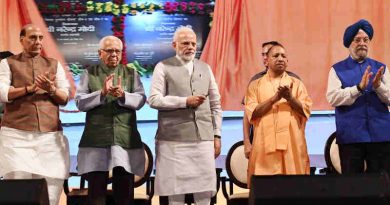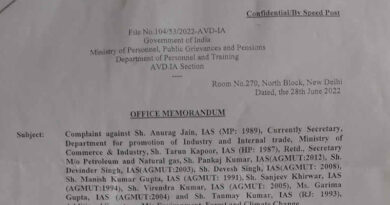11 Factors to Ring the Death Knell for Congress
By Rakesh Raman

In the past 66 years after India’s independence in 1947, Congress party – owned and operated by Nehru-Gandhi family – has ruled India for almost 50 years, which is nearly 75% of time.
Under such an unencumbered family control of over 1.2 billion people of India, the country has become a kind of monarchy, though it’s projected as a democracy. Many common people in India believe that they are still living as slaves under Congress coterie, though India is said to be a free country.
However, things seem to be changing now. The recent Assembly elections results declared in December 2013 for Chhattisgarh, Delhi, Madhya Pradesh, and Rajasthan states (where Congress was weeded out) indicate that the days of Gandhi family fiefdom are numbered.
It’s largely believed that Congress will be thrown out of power in the upcoming General / Lok Sabha elections scheduled to take place in May 2014. There are many factors that are poised to write the epitaph for Congress. Here are 11 of them.
1. Corruption
Corruption has become the lifeblood of Congress politicians. While many of its own party members – including ministers and even the Prime Minister – have faced serious corruption charges, Congress could not clearly absolve itself from all those charges. Worse, in a bid to offer its clarifications, it created an atmosphere of confusion around all those cases.
Now, the Congress party is being perceived by the people at large as a highly corrupt outfit that has failed to understand and control various forms of corruption – including political corruption, bureaucratic corruption, and corporate corruption. Thus, corruption will strike a severe blow to the party resulting in its imminent downfall.
2. Bureaucracy
While leading India’s economic reforms successfully in 1991, the-then Prime Minister P.V. Narasimha Rao was visiting Germany to invite German business people to do business in India.
As they were apprehensive of brutal bureaucracy in India, Rao assured them that “civil servants were all well-trained animals who would do their master’s bidding.”
And throughout his tenure as the Prime Minister, Rao kept a tight leash on corrupt and slow bureaucrats. As a result, India could achieve some economic development during those days. But that was then.
Now again bureaucrats have gone berserk. And the government has no control on them. As a result, the progress is either stuck or things are moving sluggishly. And in most corruption cases, politicians and bureaucrats are working hand in glove with each other.
Since the Congress party has failed to tame the bureaucrats in recent times, they are acting as slow poison for the party.
3. Dynastic Politics
Congress believes that only the dynastic rule is good for the people of India. That’s why the party is full of sons (including Rahul Gandhi), daughters, and other relatives of old politicians. When they come together in Parliament, it looks like a family birthday party.
Congress party has failed to understand that they are all part of the family fiefdom because of their bloodlines and not for their merits. It has already hurt the party a lot in terms of its performance and will further ruin its credibility among the people.
4. Headlessness
Today, Congress workers and some party men are terribly confused about the leadership in the party. Who is the leader – Manmohan Singh who is slower than a snail or Rahul Gandhi who looks like an alien, or hands-off Sonia Gandhi?
Some believe that it’s a case of inverted “T” where only Sonia Gandhi is standing at the top and all others – from PM to peon – are prostrating timidly at the bottom. This confusion has already and will further demoralize the rank and file of the party in the days to come.
5. Sycophancy
While Gandhi family members mistake it for discipline, they are in fact the victims of sycophancy. This factor is not allowing them to see beyond the eyes of sycophants who are licking the limbs of the family for their own selfish interests.
The others who are not in the inner ring of the party don’t get the opportunity to flatter the ruling family members. This is widening the chasm between people at different ranks in the party.
6. Arrogance
Almost all the Congress leaders are callous in their behavior and disappear after winning the elections. Then they start behaving like gods. Common man can’t have any access to them. It has resulted in a bitter relationship between the ruler and the ruled.
The arrogant behavior of the Congress top brass is weakening the very roots of a democratic system and has impeded the emergence of an egalitarian society in the country. As Congress has been promoting this culture of inequality, it’s soon going to harm the party.
7. Communications
Mass communications or public relations (PR) factor is a major bottleneck in running the affairs of the party. The party’s usual spokespersons are not only naïve in crisis situations, but they also lack civility in day-to-day communications.
Instead of using fair forms of communications to express their party’s point of view, their approach is mainly to digress from crucial issues by blaming the others like opposition political parties.
As a result, they end up creating a controversy around almost every issue. This has been spoiling Congress party’s image among the voters. Its top leaders prefer to stay silent and evade any dialogue.
Plus, Congress has failed to create easy communication interfaces to keep a constant touch with citizens.
8. Dead Wood
Congress has been carrying a number of old and old-fashioned politicians in the party. They exist in the party like dinosaurs who are totally oblivious of the social and economic changes happening around them.
Such members are a major bottleneck in the progress of the party, as they resist fresh ideas. Because of them, Congress party is perceived as a traditional party lacking forward-looking approach.
9. Human Resource Development
Human Resource Development (HRD) process is completely missing. Congress party’s intake processes to take fresh people in the party are not conducive enough to progress and they are not even transparent.
If you are not related to a senior Congress leader, you are not taken seriously and there is hardly any future for you in the party – however competent you may be. There are no professional programs to groom individual talent to manage various areas of operations.
As the party is not being run like a well-knit organization, most of its workers exist as pairs of hands and pairs of legs to do mundane tasks like appearing at political rallies.
10. Mismanagement
The top-heavy Congress party is clueless about the needs of people in the modern world. It is squandering tax-payers’ money worth crores of rupees (or billions of dollars) in a number of useless projects.
For example, it has been wasting huge public money in stillborn projects like National Informatics Centre (NIC), Unique Identification Authority of India (UIDAI), National Knowledge Commission, National Innovation Council, and a slew of others.
These projects are being run in a shady manner without clearly defining their objectives and parameters to calculate the return on investment on such projects.
11. Unskillfulness
There is hardly any minister in the Congress government who got the position based on their professional competence in the area of their work. In today’s cutthroat world, it’s not possible to run even a small shop successfully without understanding the professional subtleties.
But Congress party has appointed totally unskilled ministers in almost every department. Let alone knowing the subject, they can’t even think properly to run a ministry. As a result, they are dependent on bureaucrats – most of whom are equally naïve and in many cases they exploit the incompetence of ministers.
Consequently, the progress in all departments is stuck and thus there is hardly any significant progress in any field of activity in the entire country.
The factors listed above are so extensive and crucial that dozens of books can be written on each of them. But here I am postulating them briefly to sensitize the general readers and other stakeholders in the political arena.
By Rakesh Raman, the managing editor of RMN Company.
💛 Support Independent Journalism
If you find RMN News useful, please consider supporting us.




